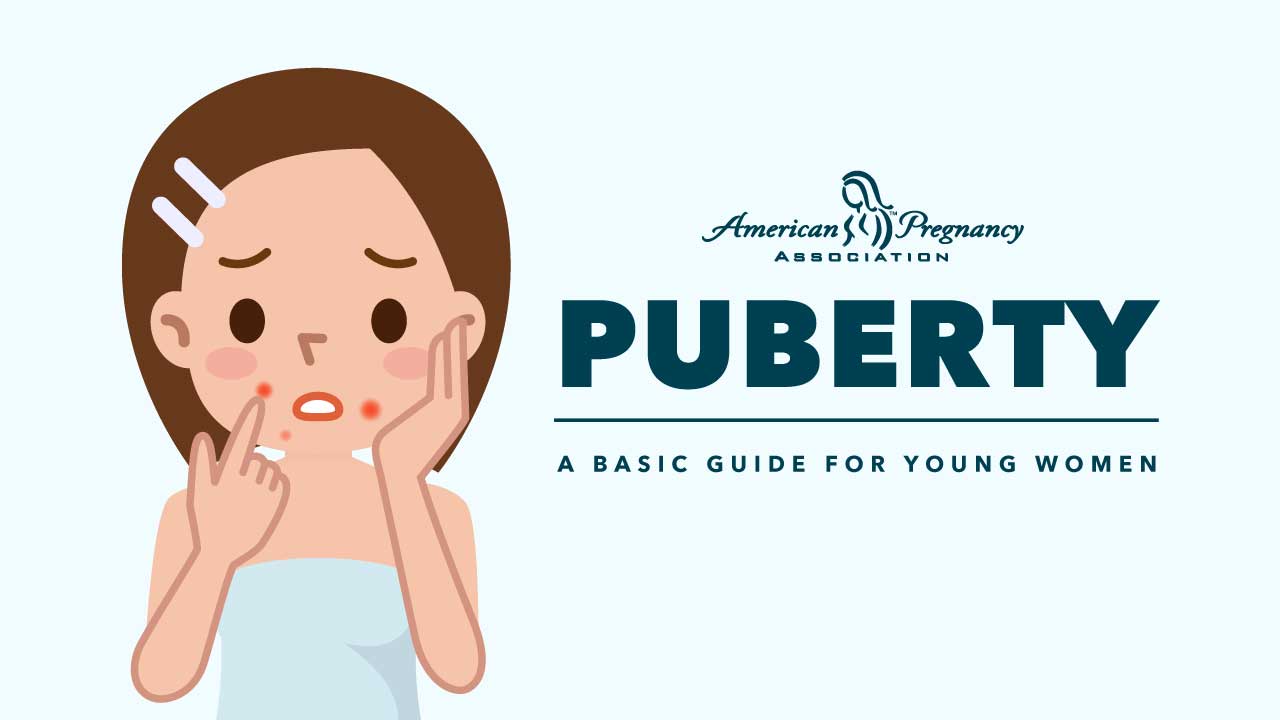Puberty is the combination of physical and emotional changes that occur when a girl or boy becomes a young woman or man. Puberty takes place at the point that the body starts to make new hormones. These hormones guide the physical changes but also produce emotional changes. The following describes changes in girls through puberty.
When does puberty begin?
The average age for puberty is 12 years old. The earliest expected age is 8 years old and the latest expected age is 16 years of age.
What causes puberty?
Puberty is triggered when the pituitary gland, a pea-sized gland near the brain, signals the body to release hormones.
Hormones then stimulate the growth and development of reproductive organs as well as other changes throughout the body.
What changes should I expect?
- Breast changes will begin to occur. The breasts will begin to grow in size, including the nipples. It is normal for one of your breasts to be larger than the other and for them to feel sore at times.
- Hair will begin to grow in new places during puberty. Pubic hair will slowly begin to grow in a triangular pattern in the pubic area. Hair under the arms will start to grow as well. You may also notice darkening of the hair on your legs or arms.
- Sweating increases and there is a change in body odor. This is a good time to start using deodorant.
- Skin will begin to become more oily than usual. This can cause acne and pimples on your face and back. There are over-the-counter medications and cleaning agents to help treat acne, and if these don’t work, there are prescription medications that should help make a difference.
- Your body will begin to change shape. The hips and thighs will widen, and the pelvis expands. Your body will begin to have more curves. You are becoming a woman!
- About six months to a year before your period starts, you may notice a clear, white vaginal discharge. This is normal and might turn yellow on contact with underwear. If the discharge has a fishy odor or is so much that you would need to wear a panty liner, contact your doctor because this may be a yeast infection.
- At puberty, you will experience your first menstrual period.
What is the menstrual period?
- This is the discharge of blood and tissue from the lining of your uterus each month. During ovulation, the lining of the uterus begins to thicken, and if the egg is not fertilized, it is shed during the menstrual period. This discharge of blood is referred to as the menstrual period but is most commonly called the period, and it is a normal function of the female body.
- A girl’s first menstrual period usually starts somewhere between age 8 and 16.
- Periods usually last 3-7 days and happen once a month.
- A girl’s average cycle, the time from the first day of bleeding of one period until the first day of bleeding for the next period, is an average of 28-32 days, although this may vary and be irregular in the beginning.
- There are many choices of feminine hygiene products, such as sanitary napkins and tampons, that can be used during your period. Take time to try different products to find which feels the most comfortable for you.
Why should I keep a calendar?
It is best to start keeping track of your periods on a calendar. Simply mark the first day your period starts on your calendar with an “X”. Count the first “X” as “day one” of your cycle.
Count the days until your next period. If you do this every month, you will know when your next period will begin. Keep in mind that in the beginning this may vary and be irregular.
Discomforts and Premenstrual Symptoms:
During or before your period, you may experience some cramping (dysmenorrhea). This happens because the uterus is a muscle, and like all muscles, it will contract and relax. During menstruation, the uterus contracts more strongly than at other times of the month. This can produce an uncomfortable feeling of cramps. Cramps will feel like a dull ache or a sense of pressure in the lower abdomen. Sometimes they come and go, growing stronger and then fading.
Other discomforts that may occur days or weeks before your period are bloating, tender breasts, headaches, feeling tired, mood swings, and food cravings.
Not everyone going through menstruation will have all of these symptoms, but these are the most common.
How can I feel more comfortable during my period?
- Use a hot water bottle or heating pad to relieve cramps and aches.
- Exercise can help relieve some of the crampings.
- Over-the-counter pain medicine such as naproxen, ibuprofen or acetaminophen can help relieve symptoms.
- Taking vitamin B regularly may lessen symptoms.
- If the cramps are unbearable and cause you to miss school or normal activities, you can visit with your doctor and get a prescription for medication which can help regulate your period and relieve some of the pain.
Compiled using information from the following sources:
Growing Up: Especially for Teens. The American College of Obstetricians and Gynecologists, 1997.
MedlinePlus [Internet]. Bethesda (MD): National Library of Medicine (US); [updated 2006 Feb 21]. Teen Development; [updated 2006 Feb 16; reviewed 2006 Jan 5; cited 2006 Feb 22]. Available from: www.nlm.nih.gov/medlineplus/teendevelopment.html






